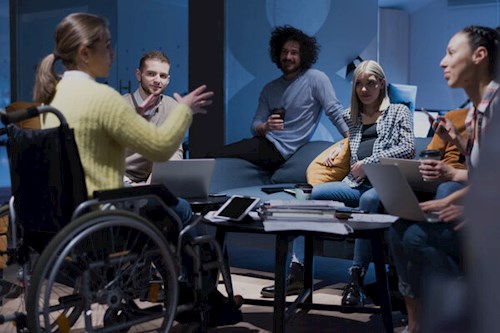Working with people who have developmental disabilities is a meaningful and important profession that requires dedication, compassion and commitment. Each person's abilities and challenges are unique. Many accommodations are simple, creative alternatives to typical practices. You can empower people with disabilities by showing them that you truly understand their needs and demonstrating genuine interest in them as individuals. People with disabilities can more fully engage in work if their places of employment follow these basic suggestions.
The first step to empowerment is understanding that each person has distinctive strengths and weaknesses. All employees should promote an environment where people feel valued for who they are as individuals, not just defined by their disability. Recognizing and embracing these differences is key.
With empathy, we forge bonds beyond typical caregiving by demonstrating genuine interest in the lives, experiences, goals and dreams of people with developmental disabilities. It's not enough to just understand someone's words; you also need to be able to interpret their deeper feelings and aspirations. We use these personal relationships as the foundation for better helping their needs and creating meaningful connections.
It is also important for them to feel involved in the company and not feel excluded. Be sure to include them in workplace discussions and encourage them to attend work parties and events. Team member bonding is an essential part of any business.
Finding innovative answers to problems frequently leads to the empowerment of those with developmental disabilities. These modifications encourage independence and a sense of success, enabling people to participate more completely in work and other activities.
Create accommodations that work with individuals' strengths and support any difficulties. Even simple adjustments to materials, instructions, pace of work or the physical environment can make tasks more achievable. What could be a straightforward substitution or adaptation for one person could be life-changing for them. The goal is to remove barriers while maintaining high expectations.
Imagine being perceived as only one thing from others. People with disabilities are complex creatures, just like everyone else, and they have hopes, likes and dislikes. When speaking to individuals with disabilities, give them the opportunity to bring up topics that are not related to their medical history.
We have a unique ability to help people focus on their strengths rather than weaknesses. This change in perspective lays the groundwork for self-confidence, and we believe that this characteristic can open doors to greater independence and a more optimistic outlook on life.
An example could be reframing setbacks as learning opportunities instead of mistakes. It can be extremely discouraging for anyone to not get the hang of something quickly or have multiple setbacks. Keep a positive mindset and help everyone on your team, not just those with developmental disabilities, have one too.
The rewards of this meaningful profession are immense for both the individuals being empowered and the employees at organizations who hire and work with them. It is fulfilling to see people thrive and overcome obstacles to achieve goals. Witnessing people transform as they gain skills and belief in themselves is incredibly rewarding.
For individuals with disabilities, the benefits of empowerment through proper support and accommodation are life changing. With self-confidence comes greater independence in all areas of life - the ability to secure meaningful employment, live more independently, self-advocate for needs, and pursue dreams and aspirations.
By incorporating these best practices of embracing individuality, making accommodations, connecting personally and staying positive even through tough times, all employees can truly empower those with developmental disabilities. With the right support, people can gain confidence and independence.

Micro-internships in supported employment offer employers a simple way to create inclusive, short-term work opportunities that help individuals with disabilities build skills and confidence. These structured projects allow businesses to evaluate talent, strengthen their teams and expand opportunity while creating meaningful pathways to long-term success through thoughtful support and clear expectations.

Supported employment is about more than job placement — it’s about helping individuals set and reach meaningful goals that build confidence, independence and long-term stability. At Weaver Industries, goal setting starts with listening and turns personal hopes into clear, achievable steps, with ongoing support along the way. As individuals grow, their goals evolve, making employment not just a paycheck, but a pathway to purpose, progress and belonging.

Weaver Industries delivers supported employment by matching individuals with disabilities to jobs that align with their strengths, interests, and support needs. Through its Supported Integration® model and ongoing job coaching, Weaver creates meaningful, sustainable employment that benefits both participants and employers while strengthening inclusive workplaces.